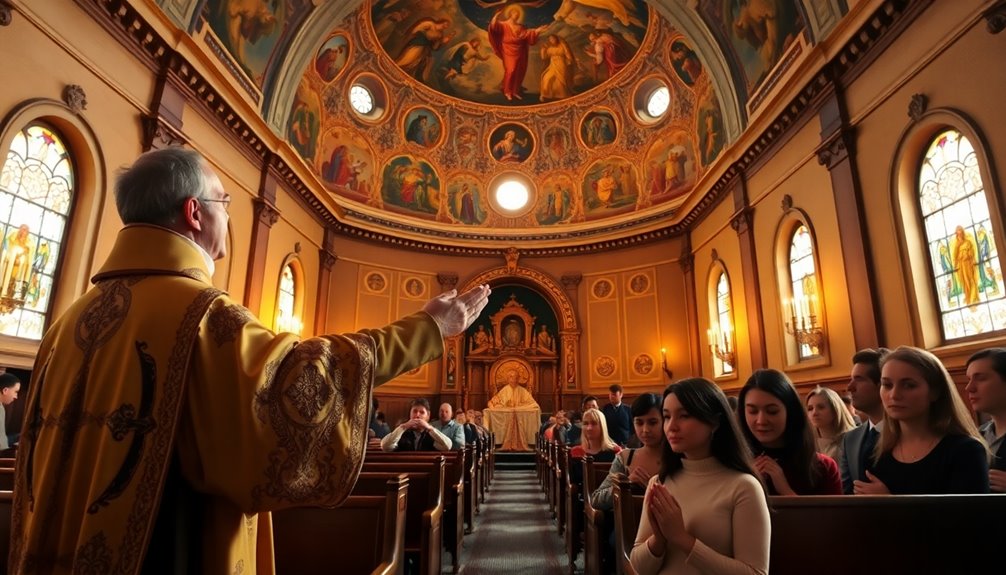An Orthodox blessing is a sacred affirmation of God's presence in your life, expressing gratitude for divine gifts. These blessings recognize the holiness of both people and objects, offering spiritual support during life's trials. You can find various types, like marriage blessings, which sanctify unions, and blessings for water that commemorate Christ's Baptism. Each celebration deepens connections within the community and acknowledges individual needs. Through these traditions, you're not just participating in rituals, but enhancing your spiritual journey and communal ties. There's much more to explore about how these sacred practices shape Orthodox faith and life.
Key Takeaways
- Orthodox blessings affirm God's presence and express gratitude for His gifts, fostering a spiritual connection among believers.
- Various types of blessings, such as Marriage and Funeral Blessings, mark significant life events and provide comfort and guidance.
- Blessings sanctify material objects, reflecting the connection between the physical and spiritual realms in daily life.
- Memorial Services and Services of Supplication enhance community bonds, offering support during times of grief or need.
- Orthodox traditions and blessings enrich the spiritual lives of individuals and communities, reinforcing faith and identity within the Church.
Understanding Orthodox Blessings
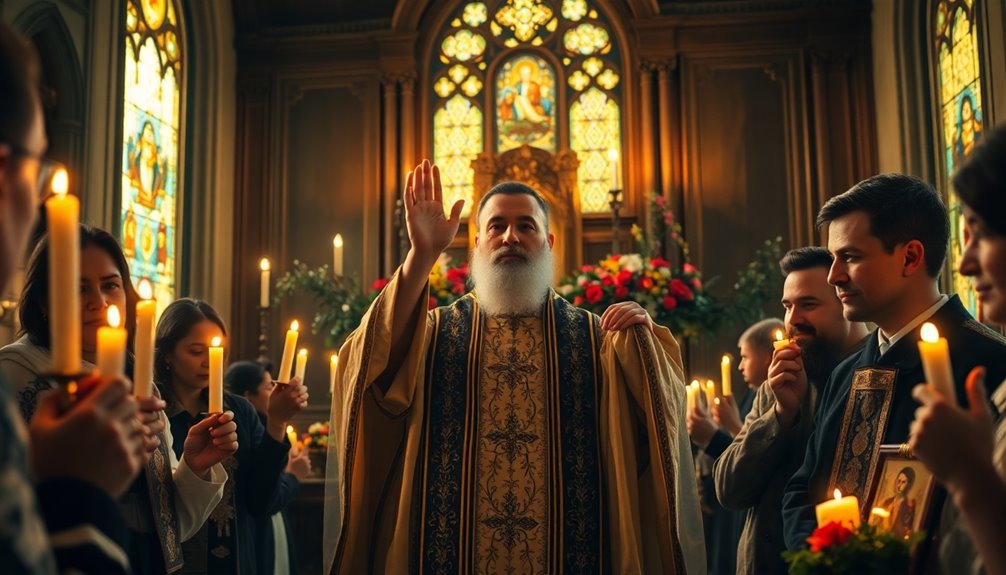
When you explore Orthodox blessings, you'll discover that they serve as a profound affirmation of God's presence in every aspect of life.
These blessings express gratitude for the good things you experience, reminding you that every blessing originates from God. They highlight the holiness of material objects, showing that even everyday items can be sanctified for special purposes. Orthodox blessings also serve as spiritual guidance, invoking God's help during times of sickness or temptation. Often, you'll see community involvement in these blessings, such as during the distribution of holy water, reinforcing the sense of unity among believers. This practice of blessings is part of the special services that enhance the spiritual life of the community.
Ultimately, Orthodox blessings invite you to recognize God's love and care in all facets of your life.
Types of Orthodox Blessings
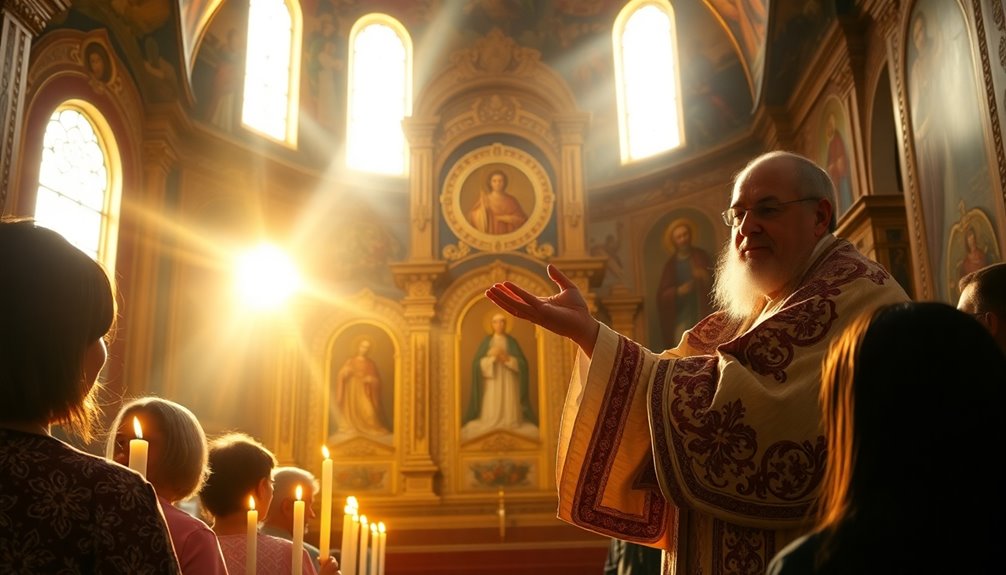
When it comes to Orthodox blessings, there are several types you can encounter. These blessings serve to acknowledge individual needs, commemorate significant events, and sanctify various objects in your life. Understanding their significance can deepen your appreciation for the rich traditions and practices within the Orthodox faith. One such blessing involves the Blessing of Wheat, Wine, and Oil, which requests the multiplication of loaves as a testament to Jesus' miracle.
Individual Blessings Overview
Individual blessings in the Orthodox tradition encompass various ceremonies designed to invoke God's grace in different aspects of life. These blessings serve to express gratitude, affirm God's presence, and seek divine intervention. Here are some key types you might encounter:
- House Blessing: A priest blesses your home with Holy Water, praying for health and family well-being. This ritual often reflects the importance of community in fostering a supportive environment.
- Business Blessing: Similar to house blessings, but focused on businesses, often performed during Theophany.
- Blessing of Bread (Artoklasia): This service uses basic elements like bread and wine, reflecting on Christ's miracles and offering thanks for life's blessings. The blessings throughout life emphasize the connection of all aspects of existence to God's love.
Each blessing connects you to the divine, reminding you of God's love and guidance.
Event Blessings Significance
Event blessings in the Orthodox tradition carry profound significance, as they connect the faithful to pivotal moments in their spiritual lives. These blessings encompass various types, each serving a unique purpose and occasion. Here's a quick overview of some key event blessings:
| Type of Blessing | Significance |
|---|---|
| Blessing of Water | Commemorates Christ's Baptism and sanctifies creation. |
| Blessing of Five Loaves of Bread | Expresses gratitude and recalls the miracle of multiplication. |
| Memorial Service | Honors the deceased and affirms the bond of faith. |
| Service of Supplication (Paraklesis) | Seeks guidance and healing through intercessions. |
These blessings not only enhance spiritual connections but also provide comfort and hope in various life situations. The Holy Eucharist serves as the principal celebration of Faith, emphasizing the importance of these blessings within the broader liturgical context.
Object Blessings Practice
In the Orthodox tradition, blessings extend beyond significant events to include the consecration of objects used in worship and daily life.
These object blessings serve to sanctify items, enhancing their spiritual significance. Here are three key types of blessings you might encounter:
- Blessing of Liturgical Implements: This includes items like chalices and vestments, ensuring they're fit for divine service.
- Blessing of Icons: Icons are blessed to be venerated, acting as windows to the divine.
- Blessing of Food and Drink: This practice sanctifies consumables, expressing gratitude and elevating the act of sharing meals. Additionally, the Prayer for Healing is often invoked during these blessings, emphasizing the importance of spiritual well-being.
Each blessing involves special prayers, emphasizing the connection between the material and spiritual domains in everyday life.
Sacraments and Their Role
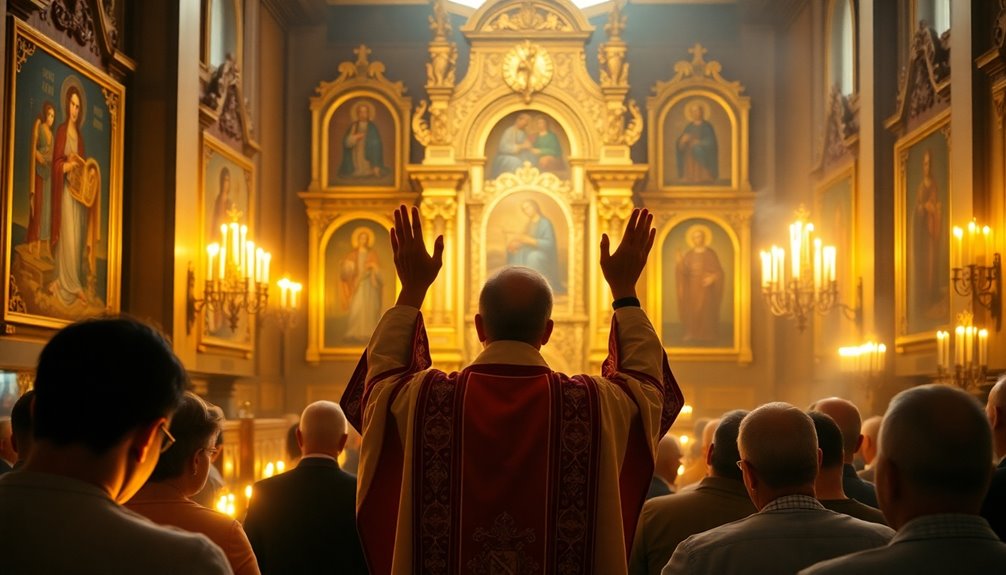
Recognizing the profound significance of sacraments in Orthodox Christianity, you'll find that these sacred ceremonies serve as essential channels for Divine Grace, connecting believers to the life of Christ.
Sacraments embody tangible signs that convey invisible grace, playing a vital role in salvation. Instituted by Christ or His Apostles, they meet the spiritual needs of the faithful. A valid sacrament requires a priest, who acts as an instrument of grace rather than its source. Grace received primarily occurs through Baptism and the Eucharist, emphasizing their importance in the sacramental life of believers.
The Orthodox Church recognizes seven principal sacraments, including baptism, chrismation, and the Eucharist, each offering unique blessings.
These rites aren't just rituals; they're spiritual vessels, allowing the Holy Spirit's grace to flow into the lives of believers, guiding them on their faith journey.
Rituals in Orthodox Worship
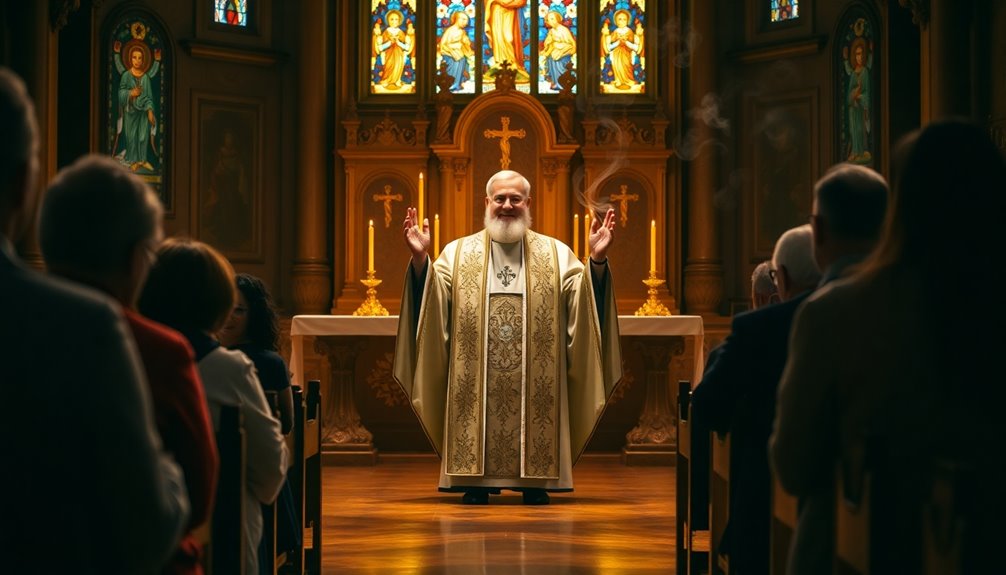
Rituals in Orthodox worship are integral to the spiritual life of the Church, as they connect the faithful to God and each other.
These rituals encompass a variety of daily practices and liturgical elements, enriching your spiritual journey. Here are three key components:
- Daily Prayer Services: Including Esperinos (Vespers) at sundown and Orthros (Matins) before sunrise, these services structure your day around prayer. The liturgical day begins with evening prayers, setting a rhythm of worship throughout the night and into the following day.
- Liturgical Structure: Antiphons and readings guide the worship experience, highlighting the connection between the Old and New Scriptures.
- Eucharistic Rites: The Liturgy of Preparation and Epiklesis invite you into the mystery of Christ's Body and Blood, deepening your communion with Him.
Each aspect of these rituals invites you to engage deeply in your faith.
Historical Background
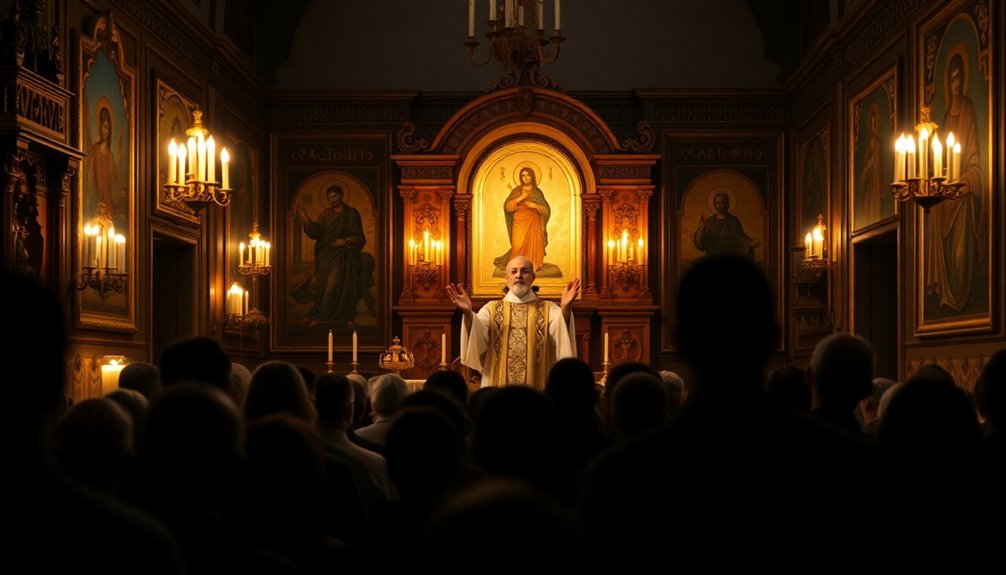
While blessings in the Orthodox Church have deep roots in early Christian practices, their significance has evolved over centuries. Originating from early spiritual leaders who imparted divine grace, these rituals reflect the Apostolic succession and Sacred Tradition. Bishops, as successors of the apostles, perform blessings, ensuring they align with canonical guidelines. An example of this is the foundation blessing of the Holy Apostles Orthodox Church, which was established in 2001.
Here's a quick overview of the types of blessings:
| Type of Blessing | Purpose | Example |
|---|---|---|
| Foundation Blessings | For new churches or buildings | Holy Apostles Orthodox Church |
| Ordination Blessings | Marks clergy's change into new roles | During ordination |
| Marriage Blessings | Sanctifies the union of couples | Wedding ceremonies |
| Funeral Blessings | Comforts the grieving and honors the deceased | Funeral services |
Traditions and Customs
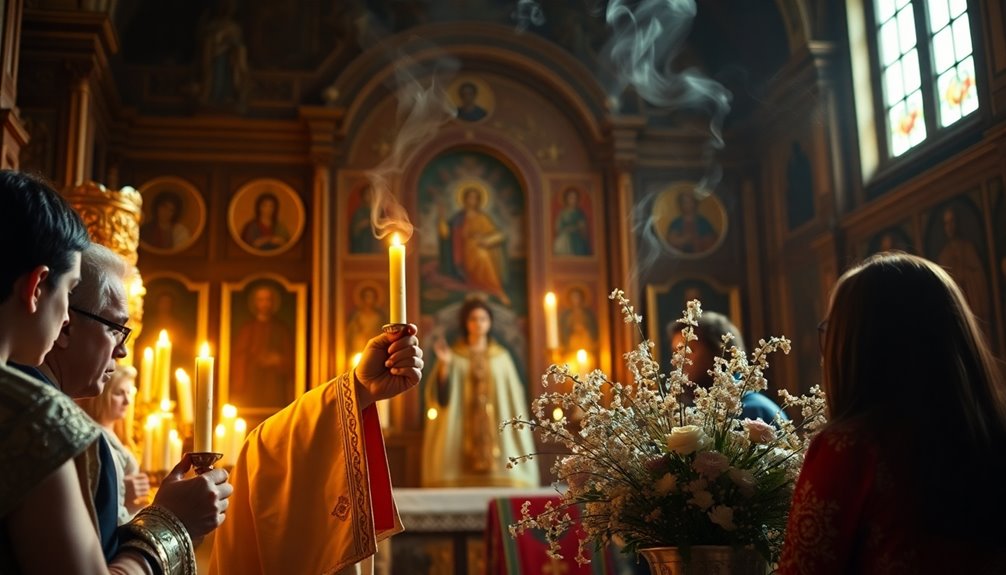
In the Orthodox Church, traditions and customs weave together the fabric of faith, enriching the spiritual life of the community.
These practices not only honor God but also strengthen your connection to fellow believers.
Here are three key aspects to reflect on:
- Sacraments: Essential rites like Baptism and Eucharist embody God's grace and community bonds. The seven Holy Sacraments serve as the main rituals that facilitate spiritual growth and communal identity.
- Liturgical Practices: The Divine Liturgy and icon veneration enhance worship, helping you experience the divine presence.
- Cultural Customs: Greetings, wedding rituals, and community involvement reflect the Church's role in everyday life.
Participating in these traditions deepens your faith and fosters a sense of belonging within the Orthodox community, guiding you on your spiritual journey.
Frequently Asked Questions
How Can I Request an Individual Blessing?
To request an individual blessing, approach the priest with respect.
Dip your right hand low to the ground and cup it with your left hand, palms up. Say, "Father, bless!" This signals your request.
The priest will trace the sign of the cross on you, and then, as a sign of reverence, kiss his hand. This act shows your respect for his role and your submission to the Church's authority.
Are Orthodox Blessings Different From Prayers?
When you think about blessings and prayers, it's like comparing apples and oranges.
Orthodox blessings are different from prayers in that they focus on invoking God's presence to sanctify objects or events for a specific purpose.
While prayers connect you directly with God for guidance and support, blessings involve rituals and community, emphasizing the sanctification of the material world.
Both are essential, yet they serve distinct roles in your spiritual journey.
Can Blessings Be Performed Outside of Church?
Yes, you can perform blessings outside of church!
Many blessings, like those for homes, objects, and even food, can occur in everyday settings.
Priests often visit homes to use holy water for blessings, while individuals can bless objects for protection.
You might also witness blessings during community events or special occasions.
These acts help affirm God's presence in your daily life, making the sacred accessible wherever you are.
What Is the Significance of Water in Blessings?
Imagine standing by a river, feeling the cool water flow past like divine grace.
In blessings, water symbolizes purification and healing. When it's sanctified, it transforms into Holy Water, embodying the Holy Spirit. You might sprinkle it in your home for protection or use it in prayer.
Just as a river nourishes the earth, this blessed water nourishes your soul, reminding you of God's presence and the sanctification of creation.
How Often Should I Seek Blessings in My Life?
You should seek blessings regularly in your life, especially during significant occasions like feast days or personal milestones.
Integrate prayer into your daily routine, such as mealtime prayers, and maintain a consistent spiritual practice.
It's beneficial to consult with a spiritual father for guidance on how often to seek blessings.
Conclusion
To sum up, exploring Orthodox blessings reveals a rich tapestry of faith and tradition. Did you know that over 300 million people worldwide identify as Orthodox Christians? This statistic highlights the global significance of these sacred practices. As you appreciate the diverse types of blessings and their roles in worship, remember that each ritual connects believers to their history and community. Embracing these customs deepens your understanding of the faith and the profound impact it has on millions.
